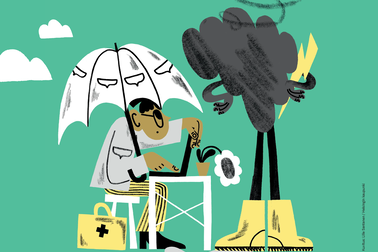
As of 2023, the salary development programme will be divided into two parts due to the reform of the Social Services, Health Care and Rescue Services Division.In the 2023 budget, EUR 7 million per year has been allocated for the salary development programme in Municipal Helsinki. Another EUR 7 million per year will be available for the implementation of the salary development programme in the Social Services, Health Care and Rescue Services Division, the funding for which will be taken from the division’s own budget. This means that a total of EUR 14 million per year will be allocated to salary increases.
“I am very happy and proud to say that we have been able to increase the impact of our salary development programme to a record high this year. These tangible increases will help us improve the competitiveness of our salaries and availability of staff and show that we value our employees,” Mayor Juhana Vartiainen says.
Salary development programme employed to increase City attractiveness as an employer and ease recruitment challenges
The 2023 salary development programme will raise the salary of more than 7,500 people. This is the fifth time that the programme will be implemented. The programme is based on a mapping of salary increase needs as well as the employer’s needs to ensure skilled labour.
Increases in the salary development programme have been allocated to professions based on a requirement assessment. The most critical professional groups were selected in cooperation with the divisions, departments, managers of public enterprises, HR professionals and the City Executive Office. Various parties, such as representatives of HR associations, have been consulted comprehensively during the preparations.
Special attention paid to employee groups with low pay
The lowest paid positions will be taken into account in the 2023 salary development programme. The City will increase all role-specific salaries of less than EUR 2,000 to at least EUR 2,000 by 1 June 2023. The increases will be implemented in phases so that role-specific salaries will be increased to EUR 2,000 either in step with the salary development programme taking effect on 1 April 2023 or the across-the-board increase on 1 June 2023, at the latest.
The increases are applied to permanent and fixed-term employment contracts with the City. The increases will not be applied to interns, students, apprenticeships or summer employees.
Recruitment challenges and general competitiveness of salaries to increase salaries in most professions
In the Education Division, the salary development programme will raise the salaries of more than 3,000 professionals in the field of early childhood education. The increase will be allocated to early childhood education childminders, special needs teachers in early childhood education and peripatetic special teachers in early childhood education. Basic education teachers who meet the eligibility criteria at certain schools will also be given raises to promote regional equality. The regional equality supplement will be granted for a fixed period of two years at a time. Special needs school assistants will also receive raises based on availability challenges.
In the Culture and Leisure Division, the raises will be allocated to the roles of stage managers, lighting engineers and sound engineers, sports instructors and lead sports instructors as well as certain unit-level supervisor roles.
In the Urban Environment Division, the raises will be allocated to property lawyers as well as various project management, engineering and supervisor roles in commissioning, land surveys, and street and traffic planning, amongst other roles. Geographic data experts and designers in the Urban Environment Division and at Stara will also receive raises. At Stara, increases will also be allocated to procurement engineers and planners as well as production engineers and specialist measurers.
Some of the meal and cleaning service staff in the school, daycare centre and care sector employed by Service Centre Helsinki will also receive salary increases.
In Financial Management Services, the increases will be allocated to payroll secretaries working in demanding payroll expert roles as well as those accountants and chief accountants who have the lowest role-specific salaries.
In the Social Services, Health Care and Rescue Services Division, the increases will be allocated to immediate supervisor roles in care work in home care, senior centres, Helsinki City Hospital, health stations and the internal medicine outpatient clinic. Increases will also be allocated to immediate supervisors working in dental health and maternity and child health clinics as well as school and student health care. Doctors will also receive raises. The salary development programme also includes funds allocated to reviewing the salaries of firefighters and senior fire fighters. The review will be carried out later this spring.
Salary development programme part of the City’s annual financial assessment process
The purpose of the long-term salary development programme of the City of Helsinki is to improve the attractiveness of the City as an employer and systematically raise salaries, especially in the professions where the City is struggling with availability of skilled staff in terms of salary competitiveness.
The salary development programme was started in 2019 to serve as a systematic and deliberate method to address this challenge. The sum available each year varies. The City Council decides on the implementation of the salary development programme and the funds allocated to it annually.


